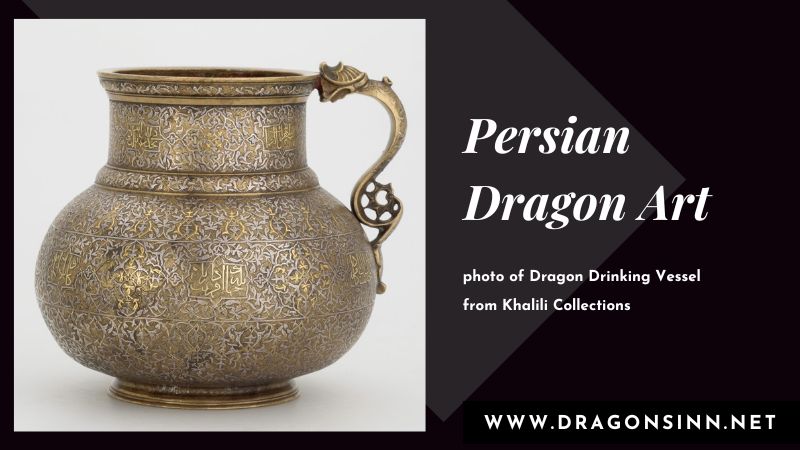A relatively short and sweet post on Persian dragon art (been sitting in my drafts for a while).
A visual art continuation of the original Middle Eastern dragons post.
Side Note: I hope to get a few of my ancient history books when I go back to Florida for a short while soon to finish up my packing.
Summary
Ancient Iran, historically known as Persia, was the dominant nation of western Asia for over twelve centuries, with three successive native dynasties—the Achaemenid, the Parthian, and the Sasanian—controlling an empire of unprecedented size and complexity.
(Source: Getty.edu)
Miniature Art: Goshtasb and the Dragon
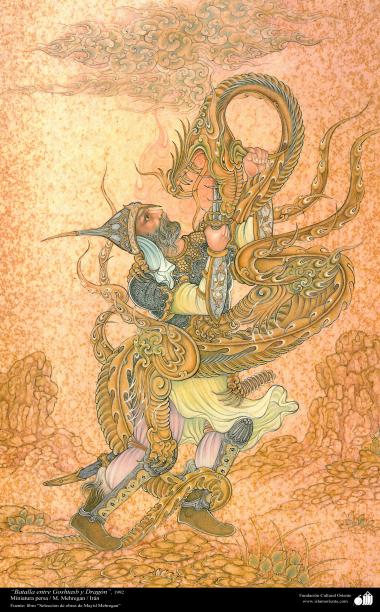
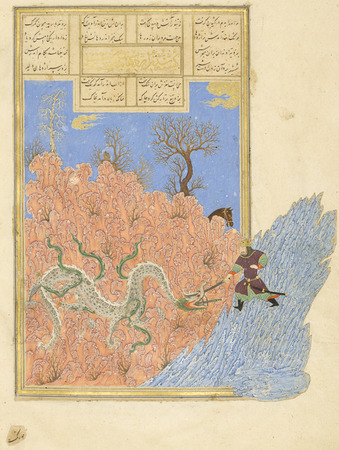
About No. 54 (second picture):
“Together with Nos. 44, 45, 46, 47, 48, 49, 50, 53 and 55, this illustration belonged to a copy of the Shahnameh made for Mohammad Juki b. Shah Rokh, brother of Ebrahim Soltan (the patron of Nos. 33, 34, 35, 36, 38 and 39).
Mohammad Juki died before the manuscript was completed. In the early sixteenth century, it came into the possession of a later Timurid ruler, Babur, who took it to India when he founded the Mughal dynasty there.”
(Source: The Fitzwilliam Museum)
About Persian miniature art
Persian miniature painting is a courtly and aristocratic art, with exquisite colors, balanced compositions, and meticulous attention to detail. . . its progression and development had a close connection to the royal patronage and the degree to which the rulers and their regional governors supported and encouraged the artists.
(Source: World History Encyclopedia)
Persian Dragon Dish
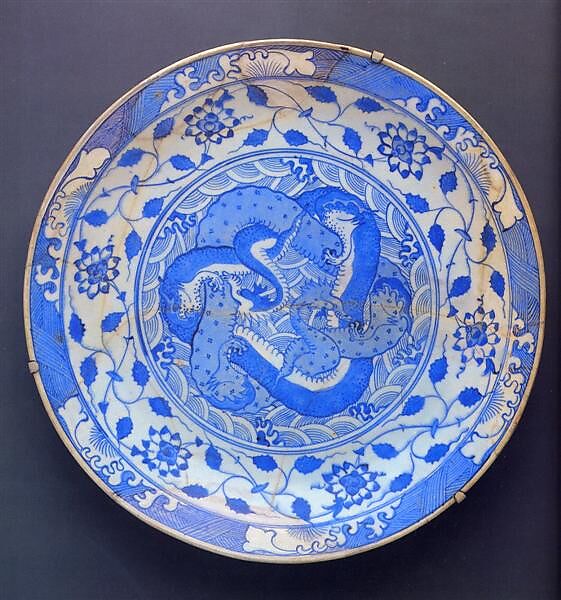
ca. 1640 | On view at The Met Fifth Avenue in Gallery 462
The designs on this large dish adapt elements of Chinese blue-and-white porcelain of various dates. The center of the dish is densely ornamented with two entwined dragons, one light blue and the other dark blue with a white underbelly, grappling with each other against a concentric wave pattern.
(Source: Met Museum)
Dragon Drinking Vessel
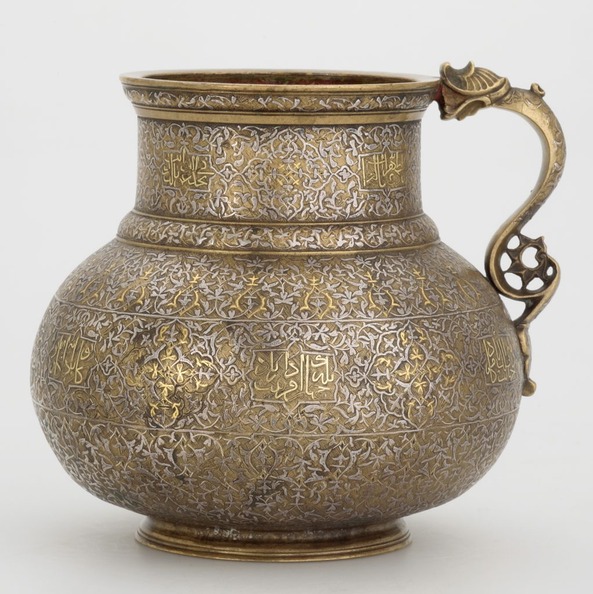
Date: Late 15th century
Location: North-east Iran
Notes: Dated metal mugs with dragon-handles are practically all from the reign of the Timurid ruler of Herat, Husayn Bayqara (r 1470–1505). They represent the final phase of the drinking vessels with such handles which first appear in the Eurasian steppes with the coming of the Mongols.
(Source: Khalili Collections)
Paired Dragons on Processional Standard (‘Alam)
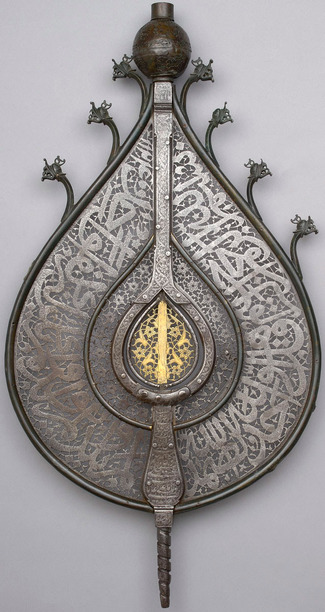
The paired dragons on this ‘alam, or standard, were paraded in religious ceremonies as emblems of power.
(Source: The Museum of Fine Arts, Houston)
Umar Defeats a Dragon
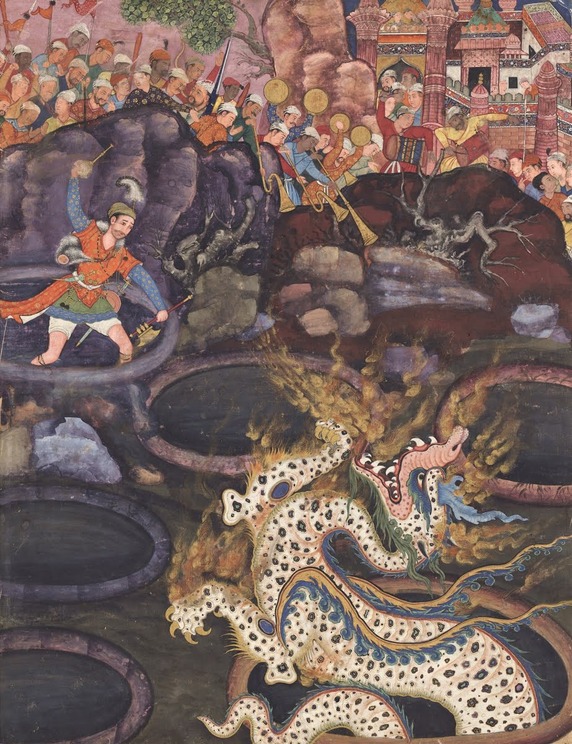
Umar Defeats a Dragon is a page from a Mughal Illuminated manuscript illustrating an episode from the Hamzanama. The page size is 55 x 70 cm. It is in the collection of the Museum of Applied Arts, Vienna, Vienna.
(Source: Wikipedia)
The Hamzanama is based on a story from a centuries-old oral tradition. It tells of Hamza ibn Abdul-Muttalib (c. 569–625), the uncle of the prophet Muhammad (c. 570–632).
[The artwork was] commissioned by Akbar, the “Great” (r. 1556–1605), probably the most influential of all Mughal rulers, and were created between 1557 and 1577 in his court workshops.
(Source: MAK – Museum of Applied Arts via Google Arts & Culture)
Conclusion
In Persianate art, dragons inhabited a wide and varied imaginative landscape that merged keen observations of nature with elements of myth.
The dragon was meant to inspire wonder, not so much in the power of fantasy, but in the real world just beyond the reach of the viewer.
(Source: Google Arts & Culture)

